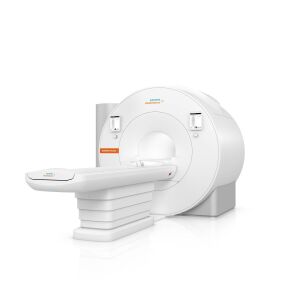by
John R. Fischer, Senior Reporter | July 06, 2022
The FDA has given clearance to the MAGNETOM Free.Star whole-body MR scanner from Siemens Healthineers.
The second system designed for the High-V MR platform, MAGNETOM Free.Star is the smallest, most lightweight scanner made by Siemens, as well as its most affordable MR scanner. It has a 0.55 Tesla field strength that, combined with deep learning technologies and advanced image processing, produces high-quality images.
The machine weighs 3.3 tons and is less than 80 inches high. It also requires less than one liter of liquid helium and has no quench pipe, reducing infrastructure and life cycle costs. “The MAGNETOM Free.Star is further proof of our steadfast commitment to providing customers with MR scanners that are more cost-effective, more easily operable, and more easily sited for installation at a wide variety of healthcare institutions across the United States.”



Ad Statistics
Times Displayed: 120335
Times Visited: 6922 MIT labs, experts in Multi-Vendor component level repair of: MRI Coils, RF amplifiers, Gradient Amplifiers Contrast Media Injectors. System repairs, sub-assembly repairs, component level repairs, refurbish/calibrate. info@mitlabsusa.com/+1 (305) 470-8013
The reduced energy consumption in MAGNETOM Free.Star brings down total life cycle costs by more than 30% over conventional scanners, and its Deep Resolve algorithms perform targeted denoising and produce high-resolution images at a level only previously possible at higher field strengths.
The FDA clearance follows that of MAGNETOM Free.Max, a compact whole-body scanner weighing less than 3.5 tons,
in July 2021. Like MAGNETOM Free.Star, it has a 0.55 Tesla field strength, uses less than one liter of helium and has no quench pipe.
Both also use Deep Resolve algorithms, as well as the myExam Companion workflow solution, which leverages AI to guide users of all experience levels through exams, regardless of patient or throughput. Because of their smaller infrastructures, both scanners can be installed in areas not previously accessible for MR, with minimal structural modifications required.
The first MAGNETOM Free.MAX scanner
was installed in November at the University of Michigan Health System. Siemens
also agreed to install it at the University of California, San Francisco as part of the school’s aim to create the first carbon-neutral radiology imaging service.

